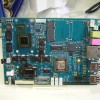quantum_register
このオブジェクトは量子ビットのセットを表します。量子ゲートオブジェクトと共に使用して、量子アルゴリズムをシミュレートすることができます。
C ++サンプルプログラム:quantum_computing_ex.cpp
#include <dlib / quantum_computing.h>
class quantum_register
{
/*!
INITIAL VALUE
- num_bits() == 1
- state_vector().nr() == 2
- state_vector().nc() == 1
- state_vector()(0) == 1
- state_vector()(1) == 0
- probability_of_bit(0) == 0
- i.e. This register represents a single quantum bit and it is
completely in the 0 state.
WHAT THIS OBJECT REPRESENTS
This object represents a set of quantum bits.
!*/
public:
quantum_register(
);
/*!
ensures
- this object is properly initialized
!*/
int num_bits (
) const;
/*!
ensures
- returns the number of quantum bits in this register
!*/
void set_num_bits (
int new_num_bits
);
/*!
requires
- 1 <= new_num_bits <= 30
ensures
- #num_bits() == new_num_bits
- #state_vector().nr() == 2^new_num_bits
(i.e. the size of the state_vector is exponential in the number of bits in a register)
- for all valid i:
- probability_of_bit(i) == 0
!*/
void zero_all_bits(
);
/*!
ensures
- for all valid i:
- probability_of_bit(i) == 0
!*/
void append (
const quantum_register& reg
);
/*!
ensures
- #num_bits() == num_bits() + reg.num_bits()
- #this->state_vector() == tensor_product(this->state_vector(), reg.state_vector())
- The original bits in *this become the high order bits of the resulting
register and all the bits in reg end up as the low order bits in the
resulting register.
!*/
double probability_of_bit (
int bit
) const;
/*!
requires
- 0 <= bit < num_bits()
ensures
- returns the probability of measuring the given bit and it being in the 1 state.
- The returned value is also equal to the sum of norm(state_vector()(i)) for all
i where the bit'th bit in i is set to 1. (note that the lowest order bit is bit 0)
!*/
template <typename rand_type>
bool measure_bit (
int bit,
rand_type& rnd
);
/*!
requires
- 0 <= bit < num_bits()
- rand_type == an implementation of dlib/rand/rand_float_abstract.h
ensures
- measures the given bit in this register. Let R denote the boolean
result of the measurement, where true means the bit was measured to
have value 1 and false means it had a value of 0.
- if (R == true) then
- returns true
- #probability_of_bit(bit) == 1
- else
- returns false
- #probability_of_bit(bit) == 0
!*/
template <typename rand_type>
bool measure_and_remove_bit (
int bit,
rand_type& rnd
);
/*!
requires
- num_bits() > 1
- 0 <= bit < num_bits()
- rand_type == an implementation of dlib/rand/rand_float_abstract.h
ensures
- measures the given bit in this register. Let R denote the boolean
result of the measurement, where true means the bit was measured to
have value 1 and false means it had a value of 0.
- #num_bits() == num_bits() - 1
- removes the bit that was measured from this register.
- if (R == true) then
- returns true
- else
- returns false
!*/
const matrix<qc_scalar_type,0,1>& state_vector(
) const;
/*!
ensures
- returns a const reference to the state vector that describes the state of
the quantum bits in this register.
!*/
matrix<qc_scalar_type,0,1>& state_vector(
);
/*!
ensures
- returns a non-const reference to the state vector that describes the state of
the quantum bits in this register.
!*/
void swap (
quantum_register& item
);
/*!
ensures
- swaps *this and item
!*/
};
inline void swap (
quantum_register& a,
quantum_register& b
) { a.swap(b); }
/*!
provides a global swap function
!*/



